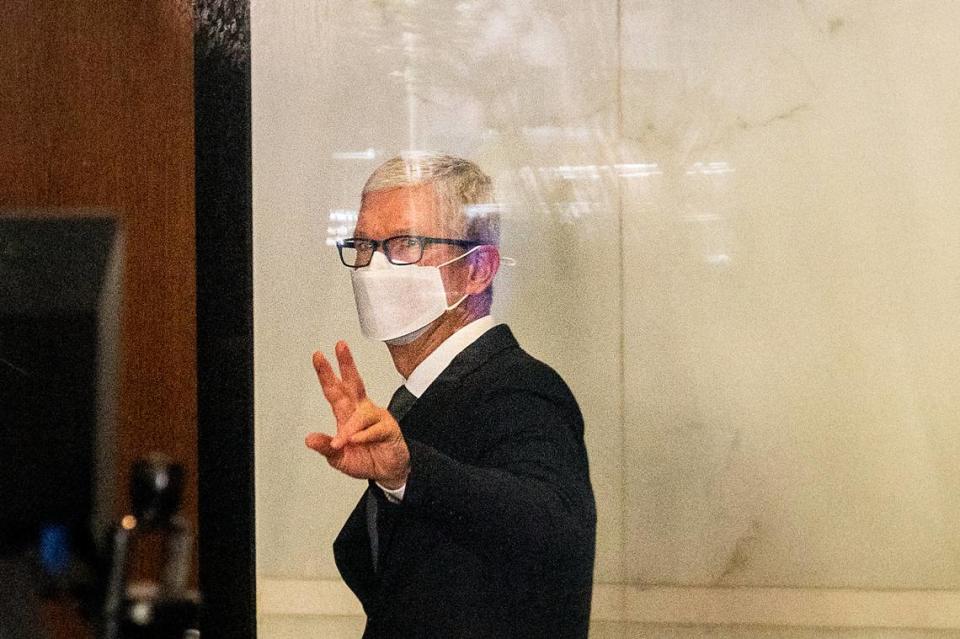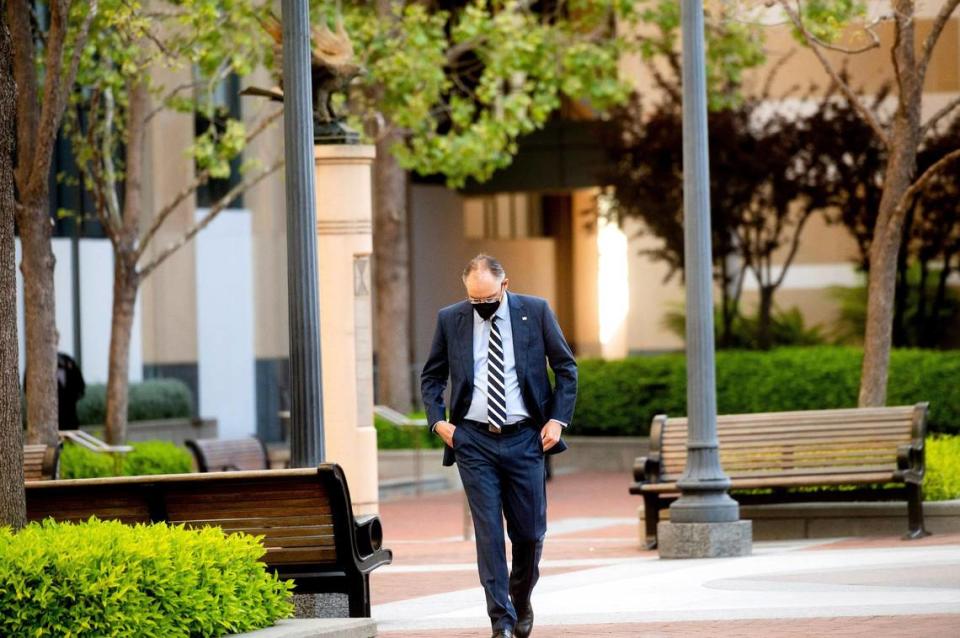The Epic Games v. Apple trial has ended. Now a judge has a consequential decision to make
After more than three weeks of in-court action, Epic Games vs. Apple adjourned Monday following hours of closing debate between Judge Yvonne Gonzalez Rogers and lawyers for the two tech companies.
The case could have a profound impact on Apple’s business model going forward, if Gonzalez Rogers sides with Cary-based Epic.
Epic launched its antitrust crusade against Apple last August when its popular game Fortnite was kicked off the App Store after Epic introduced its own payment system within the game.
Epic is pushing the judge to allow for developers to have more than one way to get their apps onto iPhones; currently the App Store is the only option. Epic also wants users to be able to use any payment system they desire. Now, only Apple’s own payment processing system is allowed.
It’s not clear when a ruling will come down in the bench trial. Gonzalez Rogers said Friday she would like to get an answer while the testimony, which included the questioning of Epic CEO Tim Sweeney and Apple CEO Tim Cook, is still fresh in her mind.
But, she noted, there are thousands of pages of documents that she will need to review, and her team is small. She did joke, though, that she would like to get a ruling in by Aug. 13 — the date Fortnite was kicked off the App Store last year.
In the end, Gonzalez Rogers’ ruling likely will be the first of many on the case. Whatever she decides will probably be appealed, and an ultimate ruling could still be years in the making.
Earlier in the trial, she acknowledged this and described herself as a “stepping stone” for the legal battle between Epic and Apple. But the resulting trial has been a fascinating look at the inner workings of both Apple and Epic, a private company that reveals little to the outside world.
Epic v. Apple: Can a business model change?
Antitrust cases can be difficult to win, and Gonzalez Rogers’ questioning of Epic’s lawyers on the last day of the trial hinted at that.
Instead of giving each side time for a closing argument, Gonzalez Rogers instead had lawyers for the two companies debate the issues in the case, with the judge asking many direct questions during the proceedings.
Gonazalez Rogers pointedly asked Epic lawyer Gary Bornstein whether a court has ever fundamentally changed a company’s business model in a way that Epic is hoping.
“Have they, in fact, said, ‘You billion dollar company ... you must fundamentally change the business model on which you operate,’” she said.
“I don’t have an example of where a private party has had precisely the same impact,” Bornstein said in an exchange with Gonzalez Rogers. He added that it has happened in some government-led cases, though, such as with antitrust cases against Microsoft and AT&T.
She also sought more understanding on what sort of remedy Epic is even seeking.
“Epic doesn’t seem interested in paying for access to customers using iOS ... (and) is attacking the fundamental way in which Apple is generating revenue,” she said. “I still don’t understand where you expect this to go.”
Bornstein said the lawsuit isn’t about forcing Apple to give away its intellectual property for free.
“Apple can charge in a non-discriminatory way,” he said. “They can charge some developers more than others depending on how they use the platform.”
But, developers should have more options to get their apps on the iPhone than the App Store. In that regard, Bornstein added, Apple is hurting innovation and keeping prices (namely the 30% fee on in-app purchases) higher than they would be in a competitive environment.
Richard Doren, Apple’s lawyer, said that would essentially result in nothing being paid to Apple, and would hurt the security of the iPhone because the company could not review the safety of apps making their way onto phones.
Apple puts premium on security
Security has been a huge focus for Apple throughout the case. Cook argued in his testimony that the company’s focus on security is a reason why people choose iPhones in the first place, and noted that Android phones have much higher rates of malware than iPhones.
Bornstein said that wasn’t the case and offered the example of the Mac computer, which allows owners to download apps from outside of the App Store. The Epic Games Store, where individuals can download video games and apps, can be downloaded on a Mac computer, for example, but not on the iPhone.
Earlier in the trial, Apple’s head of software engineering, Craig Federighi, said malware had risen to “unacceptable” levels on the Mac in recent years, CNET reported.
Gonzalez Rogers, as she did in her questioning of Cook last Friday, seemed to indicate that she isn’t convinced that Apple is facing much competitive pressure on pricing.
“The 30% (in-app purchasing fee) number has been there since the inception,” she said. “And if there was real competition, that number would move. And it hasn’t. ... So far there doesn’t seem to be anything that is in the market itself that is pressuring Apple to compete for developers.”
However Gonzalez Rogers decides in this case will be highly anticipated, even if it is ultimately appealed.
This story was produced with financial support from a coalition of partners led by Innovate Raleigh as part of an independent journalism fellowship program. The N&O maintains full editorial control of the work. Learn more; go to bit.ly/newsinnovate



